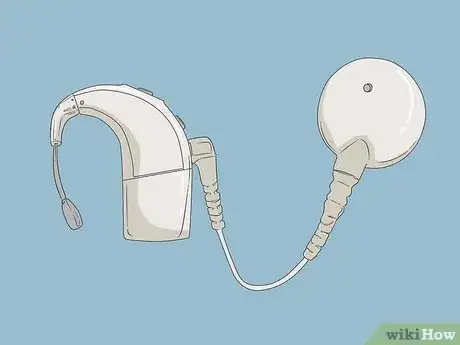This article was co-authored by Paul Chernyak, LPC. Paul Chernyak is a Licensed Professional Counselor in Chicago. He graduated from the American School of Professional Psychology in 2011.
There are 13 references cited in this article, which can be found at the bottom of the page.
This article has been viewed 33,910 times.
Losing your hearing can be devastating at first. You may struggle with everyday communication, have difficulty performing your job, or feel isolated from others. You may be forced to adopt many new behaviors into your life. You may need to learn sign language, speechreading, and adapt your house with assistive devices. While being deaf has its challenges, it is also something that can be managed with communication skills, technology, and a positive, patient attitude.
Steps
Communicating with Others
-
1Learn sign language. Learning simple signs is generally fairly easy for most people, though sign language has its own grammar rules (and even varies from country to country). While it can take up to a year to learn basic signs and feel comfortable communicating in sign language, the payoff of being able to communicate face-to-face with other deaf people will greatly enhance your quality of life.[1]
- Sign language classes are offered in many different places, including community colleges, churches, and libraries. If you can't attend a class, you can learn some basic sign online.
- Learn how to fingerspell (spelling out individual letters to form words using your hands) so you can spell words until you learn all the signs for them.
- This can also be useful when asking how to sign a specific word.
- Signers are generally patient with those new to sign language and will slow down signs and repeat them.[2] Don’t worry about being slow at first. It’s better to be slow and communicate your message effectively the first time, rather than growing frustrated at having to repeat yourself!
- Many sign languages have a simplified version, which follows English (or whatever language is spoken in your country). It might be easier to start off with this version and when you know the signs, change the sentence structure to the way preferred by the Deaf community.
- For example, Sign Supported English (SSE), uses the same signs as British Sign Language (BSL), but the former follows the same structure as English, while the latter has its own grammar. SSE may be appropriate for beginners, but BSL is what is recommended when you are able.
-
2Learn how to lip-read. While commonly known as lip-reading, it is more accurate to call this technique speech reading because it includes watching the cheeks, throat, eyes, and nonverbal cues. This is a useful skill if you are communicating with a hearing person who doesn’t sign. Keep in mind that it is best utilized in a distraction-free, well-lit environment where you are able to clearly see the speaker’s face.[3]
- Because we cannot see most sounds formed (many are formed without movement from the lips or teeth), even expert speech readers only get about 20-30% of what’s being said.[4] Therefore, it is important to have some context about the conversation before it happens.
- For example, if you were relying on speechreading for a meeting, you could get the agenda and notes ahead of time. If you were relying on speechreading for a lecture, you could ask the professor for their lecture notes beforehand.
- Pay close attention to the speaker. Watch gestures and facial expressions. Look for visual cues (for example, the speaker pointing to a bar graph at a meeting). Let others know when you need a break, as “listening” with your eyes can be very draining.
- You should not have to rely solely on lip-reading. Lip-reading is a challenge and is not a substitute for communicating via sign language or written language. It is okay to be assertive and inform someone that you do not wish to lip-read, but would rather communicate another way.
Advertisement -
3Explain how friends and family can better communicate with you. People may not be conscious of how they are speaking, or their body language, and may not be aware of how they are making it harder for you to understand them. Be polite and direct, and let them know how they can help you. You might wish to tell people to:[5]
- Get your attention before speaking to you, perhaps by waving or a tap on the shoulder.
- Keep a pad of paper and pen nearby to write things down.
- Use pantomime, facial expressions and gestures.
- Have the speaker face you directly and talk to you directly, instead of through an interpreter. Tell the person to maintain eye contact with you, and not talk to the interpreter. For example, you could let the person know, “I don’t like it when you talk to the interpreter instead of me. It feels like you are talking about me instead of with me when you say, “Can you let Jim know that I said…?”
- If you are lip-reading, make sure the speaker has nothing in their mouth (like food or gum), or covers their mouth when speaking.
- Using clear (see-through) face masks can help deaf people lip-read during the COVID-19 pandemic.
Improving Quality of Life
-
1Find new ways to do favorite things. Your hearing loss does not mean that you need to give up all of your favorite things. Many of your favorite activities may remain unchanged, or may only need to be slightly modified to account for your hearing loss. With some creative thinking, you may find that you can still find fulfillment and enjoyment from favorite hobbies and pastimes.
- For example, many movie theatres offer captioned movies, or provide portable devices that can be positioned to your comfort on your seat’s armrest.[6] For showtimes of nearby captioned movies, go to http://www.captionfish.com.
- You may be able to find local sports leagues that cater to deaf players through your community park district. You may also find that you can continue to play in your regular leagues if you ask for some modifications (the referee waves their arms instead of blows a whistle, for example).
-
2Consider using assistive devices. There are many different assistive products that have been developed to help people with hearing loss hear better, or, for those who are profoundly deaf, communicate and be alerted. There are several types of technology that hard of hearing or deaf people can use:
- Assistive listening devices (ALDs). These are devices that can help amplify or clarify sound for people with hearing loss. These work in conjunction with hearing aids or cochlear implants, and utilize electromagnetics, FM radio signals, or infrared light to transmit sound, and are often used in public places.[7]
- Augmentative and alternative communication devices (AACs). These are tools that aid in communication and help a person express themselves. These can be as simple as a board with pictures on it (for example, you point to a picture of food when you are hungry), or as complex as voice recognition software that converts speech into text (called Communication Access Realtime Translation, or CART).[8]
- Alerting devices. These are devices that alert a deaf or hard of hearing person with lights, vibrations, or loud sounds. They take the place of devices that typically alert with noise. For example, you might get a smoke detector with a strobe light, a doorbell with a blinking light, or a baby monitor that can vibrate when the baby cries.[9]
- Consider getting a hearing dog. A hearing dog’s job is to alert a deaf or hard of hearing person to a sound they are not able to hear. The hearing dog helps the person gain awareness of what’s happening in the environment by paying attention to the dog’s reactions.[10]
-
3Get support at work or school. If you are an American, for example, you are entitled to support services and/or reasonable accommodations for you to be able to perform successfully. This is covered under the Americans with Disabilities Act. Different countries may have different laws in place to provide services for the deaf.
- For example, a “reasonable accommodation” for a deaf person in the workplace might be to have a sign language interpreter present for a big meeting, or to communicate with your supervisor primarily via email.[11]
- University students can receive help from their school’s office of disability services, or office of deaf/hard of hearing services. Reasonable accommodations your school may be able to provide may include sign language interpreters, transcription services, and assistive listening devices.[12]
-
4Discover resources and organizations available to the d/Deaf. You are not alone. There are many resources available that can help your quality of life and provide support. You could ask other Deaf people for suggestions for local services, or you could consider other options:
- Check with your doctor or local hospital for suggestions about local resources.
- Ask other classmates or an instructor in a sign language class.
- Connect with your local community health department or resource center to learn about local deaf resources and what services may be available to you.
- Gallaudet University provides a comprehensive list of organizations that work with or provide information to individuals who are deaf or hard of hearing.
Finding Emotional Support
-
1Grieve the loss of your hearing. It is okay, and normal, to feel a sense of grief around your hearing loss. You are losing a way to interact with the world, and you will also face greater challenges than you did before.[13]
- Understand that grief is a process to be worked through. Although it is tempting to numb your feelings of sadness through alcohol, food, or drugs, you will not achieve any lasting healing effects. It is best to work through the sad, angry feelings, even though they hurt.
- You may wish to spend some time writing about your hearing loss, or getting in touch with a close friend and sharing your feelings.
- You may find it useful to talk to someone about how you are feeling. If you are not yet competent in sign language, you may wish to look for a counselor to do an online counseling session with you.
-
2Practice self-care. When people deal with stress or grieve the loss of a loved one, they frequently hear that they need to make sure self-care is an important part of their treatment plans. Grieving the loss of your hearing is no exception. Think of some healthy things you can do to take care of yourself during this time. For example, you could:
- Take a walk.
- Meditate.
- Write in a journal.
- Enjoy favorite hobbies that you don’t need to modify, like reading a book, crossword puzzles, or sewing.
-
3Meet other Deaf people. The Deaf community is known for being tight-knit, with a culture all its own. Make Deaf friends who can support you and offer helpful suggestions. If you are new to sign language, ask the Deaf person another way about other ways you could communicate with each other.
- The use of Deaf (with the D capitalized) refers to the culture that has developed from deaf people. People who are deaf may or may not be a part of Deaf culture.
- A good summary of Deaf culture and books, movies, and TV shows that highlight Deaf lifestyles can be found at https://www.startasl.com/deaf-culture.
- Search for a Deaf social event in your area. Try searching on Meetup at https://www.meetup.com/topics/asl/. Deaf Chat Coffee provides links to meetings at coffee shops for Deaf people around the country to get together and talk. Check out http://happy.deafcoffee.com/.
-
4Find an online community. There are many websites devoted to deaf and hard-of-hearing support and socialization. Try typing “online deaf support” or “online deaf community” into a search engine to begin exploring options.
- These websites aren’t just for talking about being deaf. You can find current events discussions, dating websites, and discussion boards for hobbies and interests.
-
5Build up your self-esteem. If going deaf has affected your self-esteem, then trying some strategies to improve your self-esteem may help you. This can take time and patience, but the end result could improve your quality of life.
- Working with a therapist is a good way to work on your self-esteem. If you find it difficult to build your self-esteem on your own, then try finding a therapist who can help you.[14]
-
6Calm down when you are upset. If you tend to get frustrated easily, then working on ways to calm yourself down can also help. There are lots of ways that you can calm yourself down. Try out some different strategies to see what works best for you.
- For example, you can use a relaxation technique like deep breathing or meditation, or you can just do something that is enjoyable to you, such as listening to some soothing music or going for a walk.
-
7Develop problem solving skills. Having good problem solving skills can also help you to deal with difficult situations that you might encounter. Try to work on developing a strategy for solving your problems. Some things you can do include:[15]
- Writing out the problem in detail.
- Making a list of the solutions that are available to you.
- Analyzing each solution to determine which is the best one.
- Choosing an option and carrying out your plan.
References
- ↑ https://nad.org/issues/american-sign-language/learning-american-sign-language
- ↑ https://nad.org/issues/american-sign-language/learning-american-sign-language
- ↑ https://www.hearinglink.org/living/lipreading-communicating/what-is-lipreading/
- ↑ http://www.ssc.education.ed.ac.uk/courses/deaf/ddec05f.html
- ↑ https://www.hsdc.org/services/deaf-101/
- ↑ http://www.captionfish.com/
- ↑ https://www.nidcd.nih.gov/health/assistive-devices-people-hearing-voice-speech-or-language-disorders
- ↑ https://www.nidcd.nih.gov/health/assistive-devices-people-hearing-voice-speech-or-language-disorders
- ↑ http://www.tcnj.edu/~technj/2003/dodds.htm
- ↑ http://www.dogsforthedeaf.org/hearing-dogs
- ↑ https://www.eeoc.gov/eeoc/publications/qa_deafness.cfm
- ↑ http://www.bestcolleges.com/resources/college-planning-for-deaf-and-hard-of-hearing-students/
- ↑ https://www.hearinglink.org/living/adjusting-to-hearing-loss/hearing-loss-emotions/
- ↑ https://psychcentral.com/lib/building-self-esteem/
- ↑ https://www.mindtools.com/pages/article/newTMC_00.htm






































































